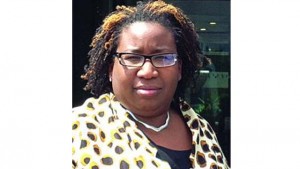 THE VALLEY, Anguilla — Dorothea Hodge, the UK and EU representative to the government of Anguilla, has resigned in protest at what she described as “governance at gunpoint”.
THE VALLEY, Anguilla — Dorothea Hodge, the UK and EU representative to the government of Anguilla, has resigned in protest at what she described as “governance at gunpoint”.
In a lengthy letter to Chief Minister Victor Banks, Hodge said that it was with a heavy heart and a great deal of regret that she tendered her resignation with immediate effect from the role as the UK representative to the government of Anguilla.
“It is with horror and disbelief that I have watched police in riot gear lined up outside the Anguillan House of Assembly to prevent ordinary Anguillans entering and exercising their right to protest. Their right to protest a bill, which has had little to no public debate, a bill that will change our island forever, and a bill that will seriously impact the life of every single resident citizen, was withheld from them. Politicians, despite the protests and very real concerns of the Anguillan people, have pushed through this bill at the expense of the democratic principles that saw them elected,” she wrote.
The legislation in question is intended, in the case of the Banking Bill, to bring Anguilla in line with the other countries governed by the Eastern Caribbean Central Bank. According to local sources, in its present form, there are many things wrong with the bill, but it was passed nonetheless without any input from the people.
The second bill is the Asset Management Act, which would give control of Anguilla’s foreclosed properties to an independent company based in Antigua.
“What this would do is sell off Anguilla’s assets without much input, if any at all from us. Anguilla is different from all of the islands because we are land owners. To have some company come in and liquidate our land, without us having a say in it, is criminal,” said one Anguillian.
Hodge echoed this concern.
“This bill will mean that some of Anguilla’s greatest assets may be sold off to the highest bidder, yet the Anguillan people have had little input into the process and have not had the opportunity to voice their opinion. If this had happened in any other Western democracy – France, Canada or the UK – there would have been uproar, just because it is happening in Anguilla – a small state – does not make it acceptable,” she wrote.
“This bill will change the island and the lives of Anguillans forever. Should we really defer our prime non-performing assets to a regional asset company, only for them to sell the land to the highest international bidder? Perhaps, the fight that our parents and our elders fought to keep Anguilla out of the clutches of St Kitts is now all but wasted,” Hodge continued.
She noted that the impact of this bill on the lives of resident Anguillans is unknown because the time to scrutinize, consult, and debate has been stolen from the people.
Henceforth when the government wishes to pass a bill that faces opposition from the people, will it simply surround parliament with armed police in riot gear, she asked.
“For me, there is never a reason for a government to insist on ‘governance at gunpoint’ as I have witnessed this week in Anguilla,” she said.
Hodge said she has spent the last 25 years of her life fighting for justice and promoting participatory democracy.
“Throughout my career, I have strived to promote the importance of citizens being fully engaged in the democratic process. Open government, freedom of information, and public consultation are fundamental to democracy. Democracy should be delivered in partnership with citizens – it must not be dictated to them,” she said.
Hodge pointed out in her letter that she has worked with the Foreign and Commonwealth Office (FCO) in London to obtain, amongst other things, £3 million (US$4.5 million) in additional funds from the UK government – the first development funds in over 12 years for Anguilla.
She added that she was surprised and disappointed to see that the chief minister still has no economic plan for the island – a request, she said, that all of the international agencies and institutions have been asking for a long time to help them formulate plans to enable them to help the people of Anguilla.
“I am further shocked to see that there is an expectation / proposal that the Anguillan people will be likely bear an additional tax burden of up to a third of the national budget, on an annual basis, to pay for the banking problems that they had nothing to do with. This is unrealistic, unfair and unnecessary; as I know other extraordinary financial solutions are possible,” Hodge wrote.
